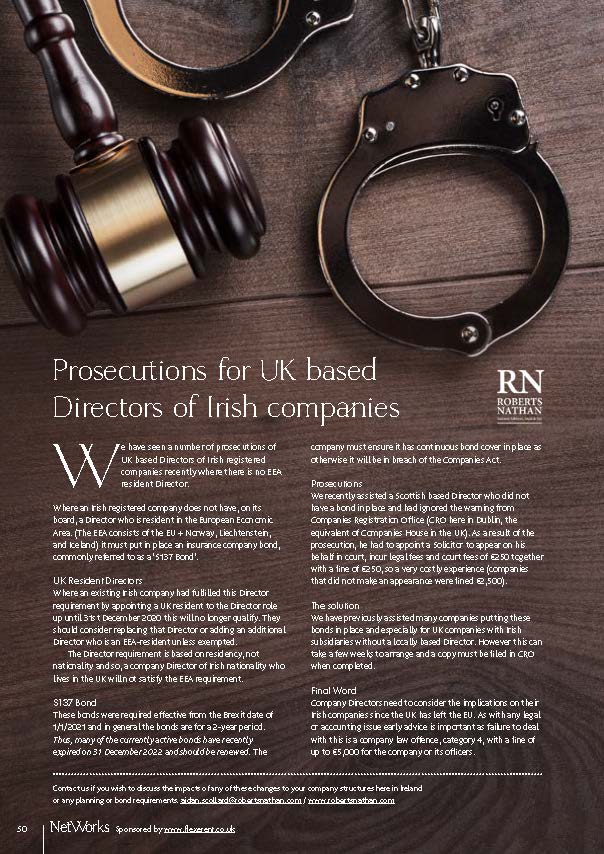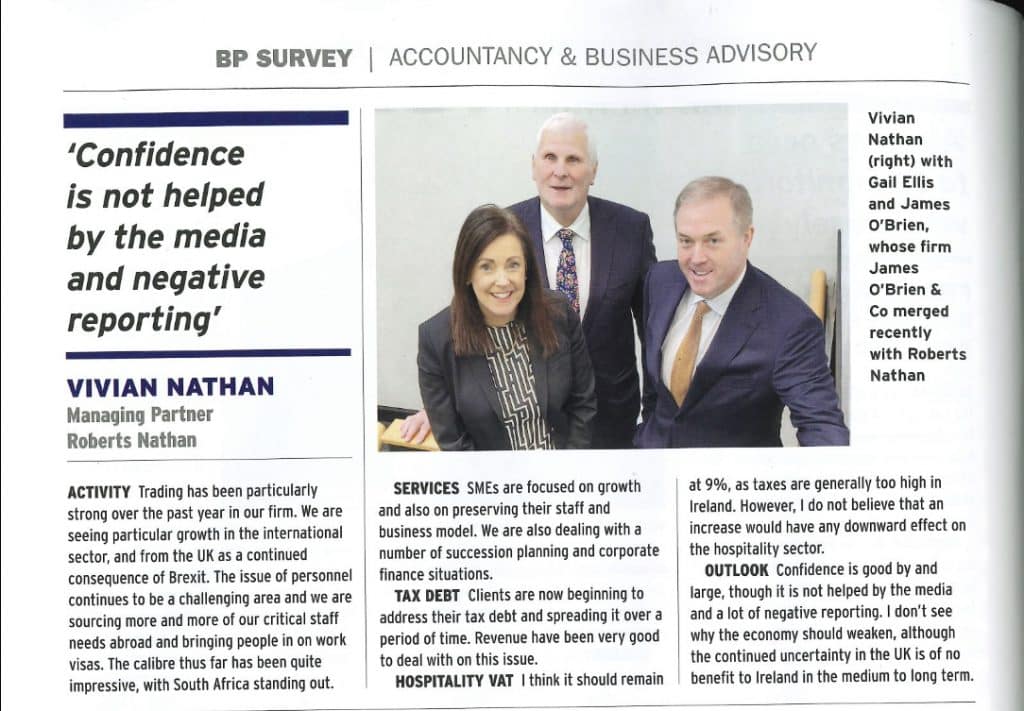Minister Michael McGrath announced his first budget as Minister for Finance yesterday Tuesday 10
th October with Pascal Donohoe making the step over to Public Expenditure on this occasion. It was a budget speech full of references to “cost of living”, “planning for the future” and the “housing crisis”. A total budget package of €14bn was announced but the immediate question arising from the speech was have the measures gone far enough to meet those areas of concern with the rising cost of living for individuals and the rising cost of running a business for business owners? We will look at the highlights from those key areas of reference below.
Cost of living
€12bn has been provided to deal with the cost of living measures.
Some of the key areas of tax saving for individuals to increase their take-home pay include:
- Raising the standard rate of income tax threshold by €2,000 to €42,000. This will save earners on €42,000 or more €400 per year in income tax.
- Increasing most tax credits by €100 which in a lot of cases will see earners benefit by €200 per year.
- Increasing rent tax credit to €750 from €500.
- Amendments to the USC which will see the 4.5% rate reducing to 4% and increasing the 2% rate band by €2,840. This could save a person earning €70k per annum €406.
Overall this could see an individual renting and earning over €70,000 having an increase in their annual tax home pay in 2024 of €1,256 per annum. However, broken down this results in €100 per month extra in that individual's wage. There was also the negative news that PRSI will raise by 0.1% from October 2024 which would see that individual earning €70k paying €70 extra per annum in PRSI.
The increase of the minimum wage to €12.70 will be welcome news for low-paid workers but it will cause additional strain on SMEs to meet increasing wage demands.
Other cost-of living measures to put more disposal funds in people's bank account include:
- The 9% VAT rate on gas and electricity to be extended by 12 months to end of October 2024.
- €450 of energy bill credits to be provided over 3 instalments between end of 2023 and April 2024.
- A €300 lump sum payment for fuel allowance recipients and a €200 lump sum for Living Alone Allowance recipients in November.
- A Christmas bonus paid in early December and a cost of living double week in January will be paid to social welcome recipients.
- A €12 weekly increase in social welfare payments.
A large headline number of €12bn does not seem to correlate to a large increase in a middle-income earners take-home pay. The lump sum energy credits will certainly be welcome to homes over the next six months but it is felt more could have been done to perhaps overhaul USC.
Planning for the future
The Minister continued the theme of planning for the future through his speech with many of the announcements in relation to corporation tax feeling very much like planning for the future as many will not take immediate effect and relate to reviews being carried out on reliefs and schemes. Below is some of the highlights of these items.
- The work on a participation exemption for foreign dividends will be examined and will not be introduced until next year's finance bill.
- A review of interest deductibility was a welcome announcement but we would hope this will be acted on in future for an area that has many complexities for corporates and advisors.
- A TALC subgroup will be formed to review business supports with the view to simplifying.
- A public consultation on VAT modernisation will take place.
- A public consultation will be launched in relation to share-based remuneration.
- A promise from the Minister to review Entrepreneur Relief to improve the incentive for founders.
In addition to this two new funds were announced in the Budget speech: the Future Ireland Fund and an Infrastructure, Climate and Nature Fund. The Future Ireland Fund is designed to protect public services while the latter is designed to invest in climate and nature-related projects.
These are all important issues and it is great to see them being highlighted but more immediate simplification of reliefs and further support for our SMEs would have been of more benefit.
To continue to show our dedication to global tax reform the introduction of the 15% corporation tax for in scope entities will be within this year's Finance Bill. However, in an effort to perhaps ease the effective tax rate increase for some of our important corporates the R&D tax credit will rise from 25% to 30% from 2024. This R&D change will be welcome news for SMEs who benefit greatly from the cash flow of this relief and the first year max payment has been increased from €25,000 to €50,000.
In addition to the R&D changes there was also more good news for the future of domestic SMEs and entrepreneurs in relation to the below key items:
- Confirmation that amendments would be made to the Employment Investment Incentive Scheme to increase the limits an investor can invest to €500,000 for a 4-year holding. It was noted that the EIIS would be reviewed going forward to simplify what is a very onerous piece of legislation at present.
- The prior amendments to the Key Employee Engagement Programme which sees it extended to end of 2025, doubling the limit of shares within the KEEP scheme to €6m and allowing CGT treatment on buy back of shares from an employee have now received EU State aid approval and can be implemented.
- A new capital gains tax relief for angel investors in innovative start-ups. Investment must be for 3 years and at least €10,000 for 5%-49% share in the entity by acquiring newly issued shares. The relief will allow a CGT rate of 16% (18% if through a partnership) on gains up to twice the value of the initial investment with a lifetime limit on qualifying gains of €3m.
- From 1 January 2025 the age category for retirement relief of 55-65 will be extended to 55-70. Therefore, a tax free consideration of €750k will be available until 70 and reducing to €500k after 70. For a transfer to a child there was previously no limit to 65 and a €3m limit after 65 but now there is a €10m limit introduced until 70 and the €3m applies after that.
- Extension of accelerated capital allowances for energy efficient equipment to 31 December 2025.
- The tapering of the tax-free element for BIK purposes on electric cars was postponed with the €35,000 threshold remaining until the end of 2025 and the €10,000 additional deduction has been extended by one year to the end of 2024. This is a welcome move to encourage the use of electric vehicles as company cars with the first €45,000 being disregarded from the OMV for BIK purposes for 2024.
The above incentives are good news for our SMEs, but they will wait anxiously to see if any action comes from the various reviews and public consultations noted above.
Housing Crisis
Opposition called it a Budget for landlords rather than tenants. This was in reference to the new relief for landlords on rental income which would see €3,000 of rental income be disregarded for 2024 at the standard rate meaning a saving of €600 for a landlord in income tax. This will increase to €4,000 in 2025 and €5,000 for 2026 and 2027. However, this may not be a generous enough measure to encourage landlords to free up property given the top rate of income tax remains at 52%. The Minister highlighted that 86% of landlords own one or two properties and it is important to encourage this large majority to keep those properties available to the rental market. The Vacant Homes Tax has been increased to 5 times the LPT from 3 from 1 November 2024.
There were some positions for people attempting to secure their first home with the news that the Help to buy scheme will be extended by 12 months to end of 2025 and a new mortgage interest relief for one year in 2023 which could provide a tax credit up to €1,250 and is based on the increase in a taxpayer’s interest between 2022 and 2023. It is only available to taxpayers with outstanding mortgages on their primary residence of between €80,000 and €500,000 at 31 December 2022.
Overall, it is not certain if enough has been done to encourage landlords to put properties up for rent and a more beneficial scheme for landlords with one or two rental properties may be required.
Agriculture
The agricultural industry felt disappointed that their budget was cut from prior year and that there was not more support for the rising costs being endured by farmers from both an inflation and environmental policy changes perspective. It would appear major planning for the future with rural Ireland is needed to ensure green policies being pursued do not negatively affect an industry that is the backbone of our nation. To add to the disappointment for farmers the flat rate addition will decrease from 5% to 4.8% from 2024. There is also now a 7-year holding requirement on land before it can avail of leasing farmland relief. There were some reliefs extended as per below highlights:
- Consanguinity relief was extended a further 5 years to 31 December 2028 which allows a 1% stamp duty rate to apply to transfers within a family.
- Accelerated capital allowances for farm safety equipment extended by 3 years to 31 December 2026.
- Lifetime relief limits from stock relief, stamp duty relief and succession farm partnerships to €100,000 from €70,000.
- Stock relief increased from €15,000 to €20,000.
The agriculture sector will be disappointed with the lack of support but there was also a lack of focus on other industries such as tourism and hospitality.
We would hope that the budget will help people with the cost of living crisis as appears to be the main intention of this budget but we would also hope and urge that the future planning commitments and various reviews would be actioned in the near future and not drift down the priority list.
October 11, 2023












 (l-r) Partners: Peter Roberts, Vivian Nathan, Gerard Hughes, Brendan Kean
We are pleased to announce the appointment of Gerard Hughes as a new partner in our Insolvency & Advisory Services. Gerard Hughes brings a wealth of experience and expertise, enhancing the firm's capabilities in providing comprehensive solutions to businesses facing financial challenges.
"We are delighted to welcome Gerard Hughes to our Insolvency & Advisory Services team," said Vivian Nathan, Managing Partner, Roberts Nathan. "Gerard's deep understanding of the insolvency landscape and his commitment to delivering exceptional results align perfectly with our firm's values and client-centric approach. His expertise will further strengthen our ability to support businesses in navigating financial complexities and charting a path towards sustainable growth."
With over 15 years of experience in the field of insolvency and restructuring, Gerard Hughes has established himself as a trusted advisor in helping businesses navigate complex financial situations. Gerard will work closely with clients to provide tailored solutions in insolvency, restructuring, and financial advisory services. His addition to the team reinforces Roberts Nathan's commitment to delivering comprehensive and reliable business advice to clients, enabling them to make informed decisions during challenging times.
(l-r) Partners: Peter Roberts, Vivian Nathan, Gerard Hughes, Brendan Kean
We are pleased to announce the appointment of Gerard Hughes as a new partner in our Insolvency & Advisory Services. Gerard Hughes brings a wealth of experience and expertise, enhancing the firm's capabilities in providing comprehensive solutions to businesses facing financial challenges.
"We are delighted to welcome Gerard Hughes to our Insolvency & Advisory Services team," said Vivian Nathan, Managing Partner, Roberts Nathan. "Gerard's deep understanding of the insolvency landscape and his commitment to delivering exceptional results align perfectly with our firm's values and client-centric approach. His expertise will further strengthen our ability to support businesses in navigating financial complexities and charting a path towards sustainable growth."
With over 15 years of experience in the field of insolvency and restructuring, Gerard Hughes has established himself as a trusted advisor in helping businesses navigate complex financial situations. Gerard will work closely with clients to provide tailored solutions in insolvency, restructuring, and financial advisory services. His addition to the team reinforces Roberts Nathan's commitment to delivering comprehensive and reliable business advice to clients, enabling them to make informed decisions during challenging times. 



